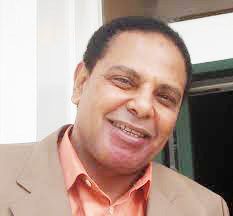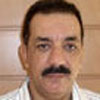From examining the apparent leniency shown by the Freedom and Justice Party’s President Mohamed Morsi toward the military, to criticism of the party’s interaction with the media, or questioning the Islamic model that will be followed by Morsi; the Muslim Brotherhood still dominates the media discourse in Egypt.
This preoccupation has also reached neighboring countries, with Saudi Arabia surprisingly broadcasting ‘Al- Jamaah’ –a TV series on the Muslim Brotherhood- this Ramadan.
While some commentators called for a ‘Third Current’, aimed at counteracting the growing influence of the Brotherhood, others asked activists to understand why many fear the revolution.
 Alaa Al-Aswany
Alaa Al-Aswany
Al-Masry Al-Youm
From the ‘Word Race Festival’ in Toulouse, Alaa Al-Aswany speaks about the French preoccupation with Egyptian affairs.
He states that in France, it is believed Egypt will be the country to shape the future of the entire Arab world in the coming period.
Refuting this claim, Al-Aswany says that, while some analysts in France regard the election of the Islamist president Mohamed Morsi as a transition from military to theocratic dictatorship, he agrees with other leftists that the results of the elections should be respected, and that Islamists will eventually reform their policies away from extremism and violence.
Al-Aswany voices his concerns about the political flexibility which has been a policy of the Muslim Brotherhood since its founding in 1928.
Morsi’s dedication to this approach, in Al-Aswany’s estimate, was shown in his inaugural speech, when he praised the Supreme Council of Armed Forces (SCAF) for their ‘wise’ leadership of the transitional period.
The author contrasts this statement with the atrocious human rights violations and killings committed by the SCAF during this transitional period.
Al-Aswany recalls the early days of the revolution, when demonstrators shouted ‘Freeze!’ while facing tear gas and thugs.
Al-Aswany calls upon Morsi to ‘freeze’ until he achieves the goals of the revolution, and not to surrender to pressure exerted by the SCAF or the Brotherhood.
 Nadine Abdullah
Nadine Abdullah
Al-Masry Al-Youm
Nadine Abdullah examines the rise of what is termed as the ‘Third Current’, which presents itself as the alternative to Islamism and the policies of the ousted regime.
The ‘Third Current’ emerged as an initiative of some political parties and the presidential campaign of Hamdeen Sabahi.
According to Abdullah, the ‘Third Current’ has to fulfill three major prerequisites in order to, at least, be able to compete in the upcoming local and legislative elections.
First, the ‘Third Current’ has to exploit the platforms of unsuccessful presidential candidates, amounting to millions of voters.
There should be explicit identification of the different voting blocks, followed by effective communication with these electoral groups.
Second, Abdullah urges the ‘Third Current’ to formulate a clear vision, finding tangible common ground the various centrist ideologies of these groups.
While the inclusion of extreme right and left currents in Abdel-Moniem Aboul-Fotouh’s presidential campaign raised doubts among voters, the clarity of Sabahi and Ahmed Shafiq with regards to social justice and security put both candidates ahead of polls.
The last prerequisite in Abdullah’s assessment is the establishment of an Executive Committee that will form the overarching structural organization for the various political parties and presidential campaigns.
Mohamed Ismat skeptically envisions a scenario whereby the president-elect Mohammed Morsi will resort to appealing for support to wide sectors in the Egyptian society, namely the salafists, by presenting himself as the champion of Shari’ah.
In Ismat’s speculation, the implementation of such policies by Morsi will constitute a replication of the Sudanese experience, which started with the military coup of 1989.
General Umar Al-Bashir and his Islamist cohort Hassan Al-Turabi used religious slogans, calling for Islamic punishments (hudud), and started cutting of hands and limbs of thieves, lashing and stoning of adulterers, and founding ‘Ghost Houses’ where political dissidents were cruelly tortured.
In lieu of resolving Sudan’s widespread impoverishment, Al-Bashir and his gang launched a Jihadist campaign to Islamize the south.
This situation ended in the creation of a new independent state in the South which would act as Israel’s proxy in the Nile headwaters.
Ismat calls upon Morsi to emulate the Turkish experience, which set out a moratorium on implementation of hudud until true economic reform was achieved.
In only one decade, Turkey has inspired the entire developing world in achieving an unprecedented economic boom, and has put itself on the correct path towards the membership of the European Union; without false electoral slogans.
 Emad Al-Din Hussein
Emad Al-Din Hussein
Al-Shorouk News
Emad Al-Din Hussein recalls his attendance of the funeral of Issaad Abdel-Gawwad, mother of the renowned poet and media anchor Abdul-Rahman Yusuf.
Being the son of the Islamic scholar Yusuf Al-Qaradawi, Yusuf hosted many of the Muslim Brotherhood figureheads.
While Hussein accepts that it is acceptable to kiss the hand of Sheikh Yusuf Al-Qaradawi, as he is a prominent cleric, he did not find a convincing answer from the Brotherhood on Safwat Higazi’s kissing of the hand of Mohamed Morsi.
Recalling how the Brotherhood fiercely denounced the former Minister Aisha Abdel-Hadi when she kissed the hand of Egypt’s first lady Suzanne Mubarak.
When questioning the head of the disbanded Parliament Saad Al-Katatni about Morsi’s equivocal statement prophecising the return of the elected institution,Katani answered that the Parliament would be restored, without adding any further details.
Hussein considers this another example of the Brotherhood’s hiding from the media, under the pretext of being under a systematic defamation campaign.
He adds that the Muslim Brothers need to realise that the days of operating underground have gone.
They need to provide answers to the media when it comes to unclear issues, and be ready to accept constant criticism of their policies, as they are now the ruling party.
 Khalid Montassir
Khalid Montassir
Al-Watan News
Khalid Montassir congratulates the director Whaid Hamid on receiving the Nile Awards for Arts.
He praises the endurance and patience he showed against the insults and personal attacks which have been directed towards him on the wake of the broadcasting of his TV series ‘Al Jammaah’.
The series analyses the rise of the Muslim Brotherhood, and examines the collaboration between Hassan Al-Banna, the British occupation, and the House of Saud.
Amidst the campaign of “ideological terrorism” aimed at the TV series, and the loss of any hope that Egyptian TV channels would ever transmit Al-Jammah episodes, against all odds, the Saudi channel, MBC, purchased the rights to broadcast the TV series during Ramadan.
Montassir suggests that the Saudis, although they supported the Muslim Brotherhood against Nasser and Sadat, have become aware of the potential dangers this group might inflict on them.
The House of Saud is wary of a reccurance of attacks from Al-Qaeda on the basis of American sponsorship of Saudi Arabia, and Saudi’s “un-Islamic” policies.
The Saudi monarchy picked up this series after the skyrocketing rise of Muslim Brotherhood movements across the Arab region, in order to tell its subjects, ‘Watch this TV series, it contains an important message’.
 Ammar Ali Hassan
Ammar Ali Hassan
Al-Watan News
Ammar Ali Hassan recounts some of the main reasons why many in Egypt are nostalgic for the days of Mubarak.
The human psyche, by nature, does not feel at ease with change, and few in Egypt have the true soul of adventure.
Further, some have tied their memorable moments in the past to the presence of Mubarak, while others profited from the climate of corruption under Mubarak, which extended to all levels of Egyptian life.
Hassan calls upon the revolutionary youth to understand the nature of fears among the wider sector of the population who are resisting change, and to bring before them proof that the post-revolutionary future is bright.
Hassan rejects calls to erect guillotines for whoever possesses a membership card of the disbanded National Democratic Party (NDP).
He considers many of the NDP members as having being subjected to compulsory registration in the party.
Many resorted to NDP membership in order to avoid being persecuted by the State Security, or simply to guarantee their rights.
Hassan cites the failure of the NDP to mobilise its supporters against the revolutionary crowds, and how it ended up having to use thugs and criminals to counteract the revolution.




